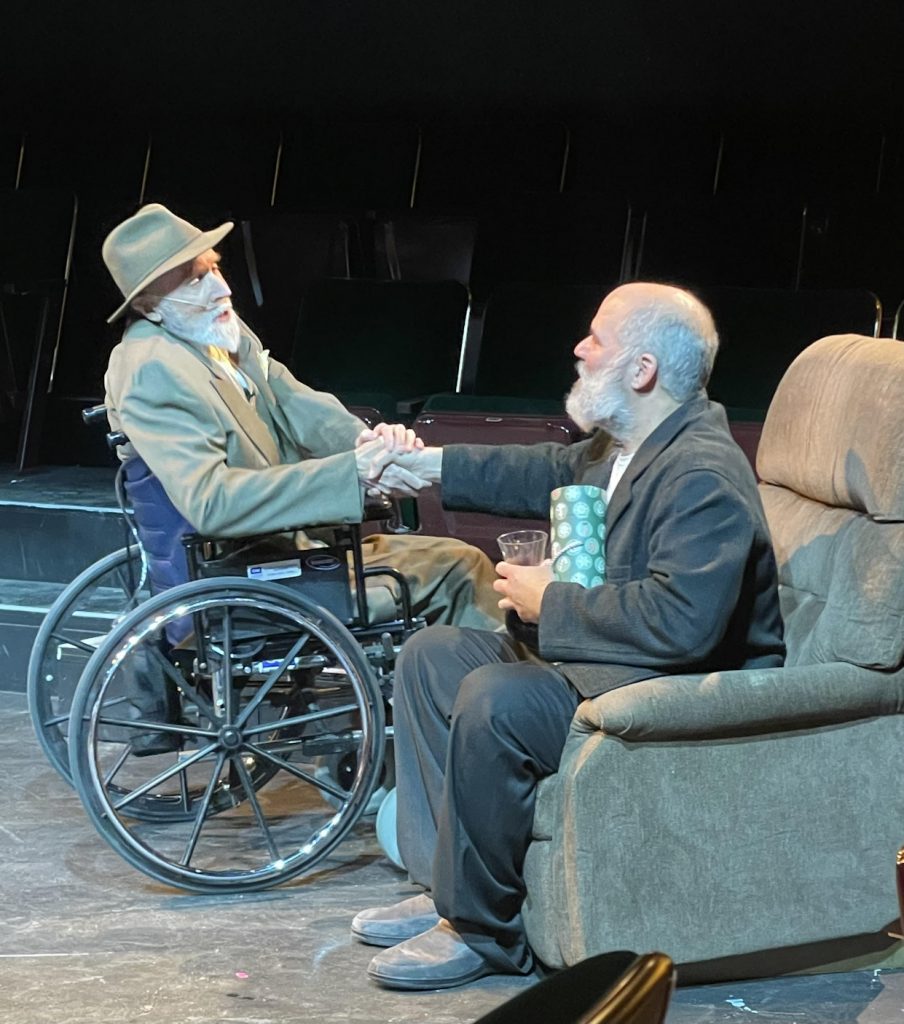
The Seafarer’s a boozy dramedy that ventures into the supernatural.
The holidays are a complicated time of year for most people — certainly a bit more than how that time is depicted in most media, with cozy mugs of cocoa and Christmas wishes being granted. Still, it might be a bit dire if all we experienced in the winter months were grave depictions of loneliness and misery.
And so, here we have The Seafarer, a Christmas fable that mightily hoists up the light and the dark on either of its shoulders, resulting in a dark comedy and family drama that still, somehow, defies characterization. One thing it acknowledges, though, that many other holiday entertainments elide, is the profound presence of alcohol in this season. The Seafarer is an almost claustrophobically boozy play; one wonders how long it’s been since some of the characters have even touched water, let alone consumed it.
First, we meet Sharky (Brian S. Lewis) and Richard (Wesley Walker), two alcoholic brothers in a Dublin suburb. Richard has recently lost his sense of sight, thanks to an unfortunate injury, and Sharky has decided to help his brother make it through Christmas, even though Sharky has vowed to stay sober. Sharky’s history of drinking has brought him to a place where he seems like he wants to make a change, while Richard’s new blindness has only refueled his love of the bottle.

It isn’t long before the drinking buddies arrive: nervy party-boy Nicky (Luke Amundson); family man Ivan (Gabriel McClelland), who’s only just woken up from last night’s bender; and the mysterious Mr. Lockhart (Martin J. Mackenzie), who seems to know something of Sharky’s past. When a game of poker is suggested, the night takes a turn, veering into the territory of magical realism and folk tales.

To say much more would be spoiling the fun, and the story — for however many turns it takes — is so rooted in classical storytelling that its beats may be familiar, but its setting is its novelty. Conor McPherson, The Seafarer’s playwright, often gets shouted out for how he blends traditional Irish playwriting with more modern conventions. In this way — at least going by this play — he feels like a less edgy Martin McDonagh, another Irish playwright who also blends the structure of fables with modern trappings.
In a play where every actor is required to put on an Irish accent, we’re happy to report that everyone acquits themselves nicely. Freed from that pitfall, Lewis and Walker provide the ever-important fulcrum the rest of the play hinges on; despite everything else that happens, the interplay between these brothers must be strong, and they nail it. Amundson and McClelland bolster the show with their performances, which initially feel like comic relief, but which build up everything around them.

Finally, Mackenzie is a treasure to watch. As the man who disrupts the show and sends it off in a different direction, the character is portrayed by an unassuming person in a wheelchair and with an oxygen tank. Without giving too much away, the portrayal of this character as a person with such limitations is an intriguing take. Mackenzie’s air of both menace and frivolity add a bit of crackle to the show.
In a season filled with sickly sweet entertainment, a bit of peat smoke and black humor can offset the treacle. The Seafarer finds a precarious balance, teasing at a profound darkness, but finding a bit of light at the other side.
WHAT
The Seafarer
WHEN
7:30 p.m. Dec. 1-17, Sundays at 2 p.m.
WHERE
Lakewood Playhouse
5729 Lakewood Towne Center Blvd. SW, Lakewood, WA
TICKETS
$23-$29
LEARN MORE
https://www.lakewoodplayhouse.org/


